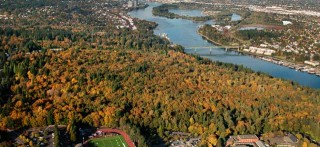The City of Portland’s defensive legal move to ban mountain biking in Southwest Portland’s River View Natural Area is an unfair breach of trust with mountain bikers, according to The Oregonian’s editorial board.
“River View, where cycling has occurred for years, remained the best city option for serious, if limited, mountain bike trails,” the newspaper wrote in a scathing editorial published online Wednesday. “To that end, cyclists attended meetings, participated enthusiastically in the public process upon which Portland places so much emphasis and trusted the city to act in good faith. The city did not.”
As we reported on Monday, Commissioners Amanda Fritz (who runs the city Parks Bureau) and Nick Fish (who runs the Bureau of Environmental Services, which manages stormwater runoff) announced that although “passive” activities such as “hiking, wildlife viewing, stewardship, education, research, etc” will continue to be allowed in the natural area along the Willamette River after March 16, mountain biking no longer will.
For many in Portland’s large and rapidly growing community of mountain biking lovers, the response was outrage and despair.

(Photo: Paul Souders)
Southwest Portland resident Paul Souders seemed to crystallize many feelings in a comment on this site:
I (and many other IMBA/NWTA members) volunteered to remove ivy, improve trails, and plant native flora. All with the good faith that by being Good Citizens we could sway hearts and minds. I involved my kids with this process, for example my son and I planted vine maples along Palatine Hill road last winter. He was REALLY EXCITED to ride here — that’s why he bought a mountain bike, and indeed he talked me into NOT selling mine, so we could ride together on the trails almost literally out our back door! Sorry little buddy, you can’t ride here anymore either.
I put literal blood and sweat (no tears yet…) into showing that I’m a good guy and can I please have a little singletrack? Well, sorry, chump!
For 20 years I’ve recommended this course of action: work within the system, be a good citizen, etc. vs poaching trails. I feel like a sucker. You can see where that will get you.
Advertisement
The Oregonian’s Kelly House followed up with a report Tuesday that added some back story: the root problem here is that the city purchased the land in 2011 with money from stormwater utility fees. The purchase was pegged on a disputed claim that protecting the 146-acre riverside parcel from development would protect habitats in the Willamette.
From House’s coverage:
City officials acknowledge their decision puts the squeeze on mountain bikers, but they contend keeping the trails open creates environmental hazards that could put the entire property in jeopardy.
River View was one of multiple city projects called into question in a 2011 lawsuit alleging the city improperly used utility ratepayer money on items that didn’t qualify for the funds. A judge ruled the property’s ecological importance makes it an appropriate purchase.
City attorneys warned Bureau of Environmental Services leaders that allowing “active recreation” like mountain biking at River View could jeopardize that ruling, said Jim Blackwood, Fish’s policy director.
The city attorneys presumably consider biking down a hill to be active and/or recreational in some way that walking or running down a hill is not — or at least they fear that a judge might say so.
It’s the convoluted cause of this bike ban that seems to have pushed the Oregonian’s editorial board to weigh in on Wednesday:
The problem isn’t that mountain biking threatens to do meaningful environmental harm. Properly managed, it doesn’t. The problem, rather, is that the city is worried about the legal ramifications of using utility funds to buy parkland for the purposes of enhancing watershed health, then allowing aggressive, if badly needed, recreational use. … Cyclists aren’t the problem, in other words. They’re collateral damage.
The editorial closes with sentiments that echo Souder’s (and also of mountain-biking leaders like Kelsey Cardwell, board president for the Northwest Trail Alliance):
The memo concludes by promising to seek money for a “Citywide Off-Road Cycling Plan” and – gallingly – noting that “community advocacy will be necessary to encourage the Mayor and Council to fund this request.” Pulling the rug out from under a constituency that had been playing by the rules is a pretty strange way to enlist its assistance. It should come as no surprise to Fritz, Fish and other city officials that cyclists don’t trust them much.
There is a way out, however: If the city wants to re-establish faith with mountain biking advocates, it should exercise an abundance of leadership – heck, even a little will do – and reconsider its bike ban. On the off chance that this creates legal complications – and this is far from a certainty – at least commissioners can say they went out on a limb for their constituents.


